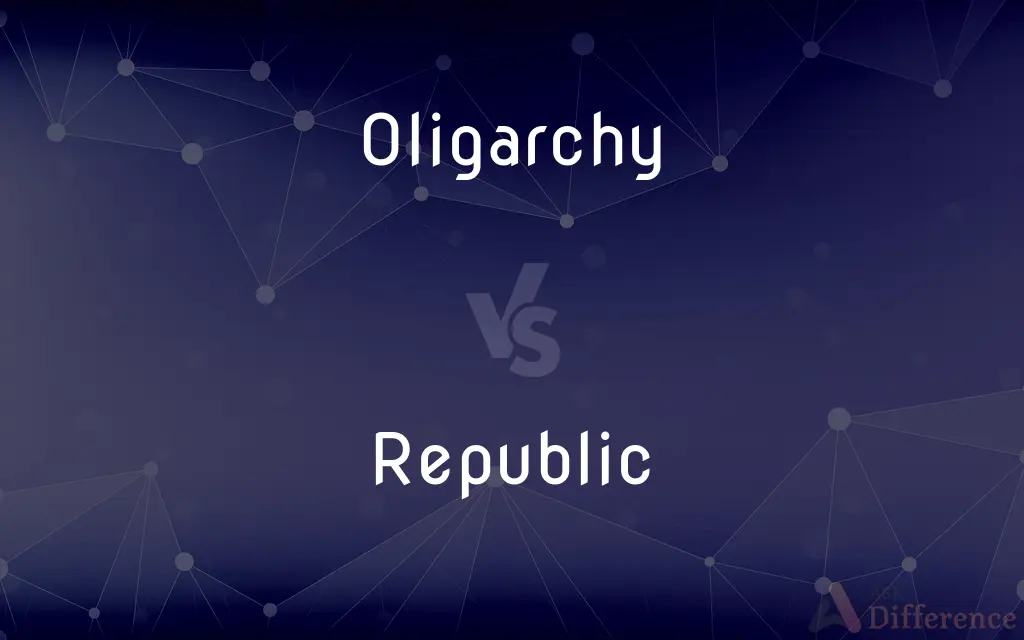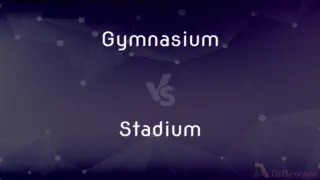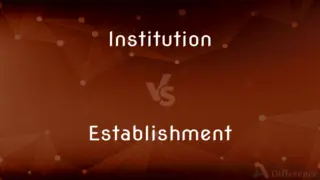Oligarchy vs. Republic — What's the Difference?

Difference Between Oligarchy and Republic
ADVERTISEMENT
Compare with Definitions
Oligarchy
Oligarchy (from Greek ὀλιγαρχία (oligarkhía); from ὀλίγος (olígos) 'few', and ἄρχω (arkho) 'to rule or to command') is a form of power structure in which power rests with a small number of people. These people may or may not be distinguished by one or several characteristics, such as nobility, fame, wealth, education, corporate, religious, political, or military control.
Republic
A republic (Latin: res publica, meaning "public affair") is a form of government in which "power is held by the people and their elected representatives". In republics, the country is considered a "public matter", not the private concern or property of the rulers.
Oligarchy
Government by a few, especially by a small faction of persons or families.
Republic
A state in which supreme power is held by the people and their elected representatives, and which has an elected or nominated president rather than a monarch.
Oligarchy
Those making up such a government.
ADVERTISEMENT
Republic
A political order whose head of state is not a monarch and in modern times is usually a president.
Oligarchy
A state governed by a few persons.
Republic
A nation that has such a political order.
Oligarchy
A government run by only a few, often the wealthy.
Republic
A political order in which the supreme power lies in a body of citizens who are entitled to vote for officers and representatives responsible to them.
Oligarchy
Those who make up an oligarchic government.
Republic
A nation that has such a political order.
Oligarchy
A state ruled by such a government.
Republic
Often Republic A specific republican government of a nation
The Fourth Republic of France.
Oligarchy
A form of government in which the supreme power is placed in the hands of a few persons; also, those who form the ruling few.
All oligarchies, wherein a few men domineer, do what they list.
Republic
An autonomous or partially autonomous political and territorial unit belonging to a sovereign federation.
Oligarchy
A political system governed by a few people
Republic
A group of people working as equals in the same sphere or field
The republic of letters.
Republic
A state where sovereignty rests with the people or their representatives, rather than with a monarch or emperor; a country with no monarchy.
The United States is a republic; the United Kingdom of Great Britain and Northern Ireland is a constitutional monarchy.
Republic
(archaic) A state, which may or may not be a monarchy, in which the executive and legislative branches of government are separate.
Republic
One of the subdivisions constituting Russia. See oblast.
The Republic of Udmurtia is west of the Permian Oblast.
Republic
Common weal.
Republic
A state in which the sovereign power resides in the whole body of the people, and is exercised by representatives elected by them; a commonwealth. Cf. Democracy, 2.
Republic
A political system in which the supreme power lies in a body of citizens who can elect people to represent them
Republic
A form of government whose head of state is not a monarch;
The head of state in a republic is usually a president
Share Your Discovery

Previous Comparison
Gymnasium vs. Stadium
Next Comparison
Institution vs. Establishment













































